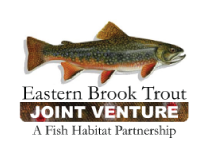Workshop: Understanding Genetics for Successful Conservation and Restoration of Resilient Chesapeake Bay Brook Trout Populations
view workshop info on the Chesapeake Research Consortium website
September 28-29, 2021 at ThorpeWood in Thurmont, Maryland.
Traditionally, fisheries management has focused on the abundance, distribution, and size structure of populations. Although these factors remain key aspects of management, a large and growing body of evidence highlights the importance of genetics in conserving wild populations, especially when populations are small and isolated (Frankham et al. 2017). Local adaptations are very common among fishes and help populations cope with specific conditions in their local environment (Fraser et al. 2011). The field of conservation genetics and genomics is highly technical and has advanced rapidly in recent years, offering a wealth of information to support brook trout conservation and restoration. A major impediment to successfully incorporating these advances into conservation outcomes is that most fisheries managers have only a basic understanding of fish genetics and its relevance to their management decisions.
The two-day workshop will bring experts in the field of fish and brook trout genetics together with fishery managers and practitioners to provide the latter with the both the general knowledge of fish genetics and recent scientific advances. The main objectives are to: (1) communicate the importance of genetic information for Brook Trout management and review key conservation genetics concepts and (2) explore available genetics datasets and explain how they can be used to support management.
RSVP for this event here. or email Meg Cole colem@chesapeake.org
Document Actions





